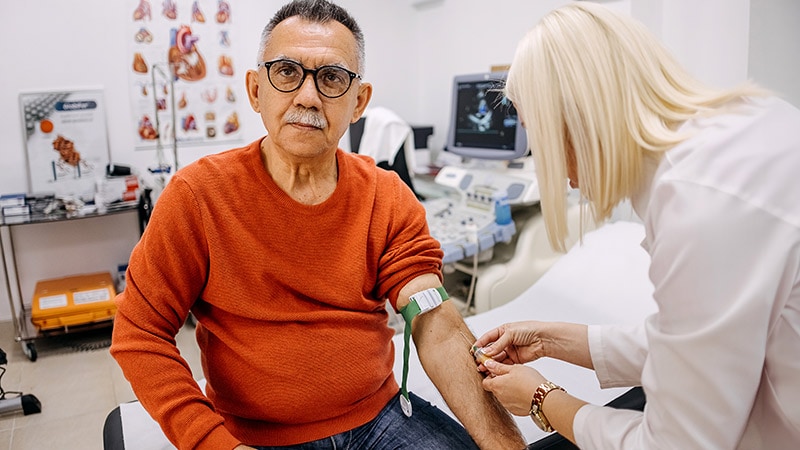Underutilization of Genetic Testing for Homologous Recombination Repair Mutations in Metastatic Castration-Resistant Prostate Cancer Patients in the United States
Core Concepts
Genetic testing for homologous recombination repair (HRR) mutations is underutilized in patients with metastatic castration-resistant prostate cancer (mCRPC) in the United States, despite its potential prognostic and predictive value for targeted therapies.
Abstract
The study examined the utilization of genetic testing for HRR mutations among 9,395 patients with mCRPC in the United States between 2014 and 2022. The key findings are:
- Only 37.7% of patients received HRR mutation testing, with the majority (62.3%) not undergoing the test.
- The proportion of patients tested peaked in 2020 at 55.5%, with a slight decline after 2020, possibly due to the COVID-19 pandemic.
- From 2014 to 2019, 74% of tested patients and 23% of all patients underwent the test more than 12 weeks after initiating first-line therapy. However, the timing of testing improved in 2020, with 92% of tested patients and 46% of all patients receiving the test within 12 weeks of starting first-line therapy.
- Factors associated with lower odds of HRR testing included being diagnosed before 2018, no prior treatment for localized disease, poorer performance status, de novo disease, lower socioeconomic status, Medicaid insurance, treatment outside academic centers, and older age.
- The authors highlight that the low testing rates would further limit the utilization of targeted therapies among eligible patients.
Customize Summary
Rewrite with AI
Generate Citations
Translate Source
To Another Language
Generate MindMap
from source content
Visit Source
www.medscape.com
Genetic Testing Low in Castration-Resistant Prostate Cancer
Stats
37.7% of patients (3,538 of 9,395) received HRR mutation testing.
From 2014 to 2019, 74% of tested patients (1,546 of 2,090) and 23% of all patients (1,546 of 6,688) underwent the test more than 12 weeks after initiating first-line therapy.
In 2020, 92% of tested patients (304 of 327) and 46% of all patients (304 of 662) received the test within 12 weeks of starting first-line therapy.
Quotes
"These findings highlight disparities in receiving HRR testing in the US."
"While the use of genomic-based therapies was not the focus of this study, the low testing rates observed in our cross-sectional study would be further compounded by low utilization of targeted therapies among patients who are known to be eligible."
Key Insights Distilled From
by Megan Brooks at www.medscape.com 05-17-2024
https://www.medscape.com/viewarticle/genetic-testing-rates-low-metastatic-castration-resistant-2024a10009ek
Deeper Inquiries
What are the potential barriers to increased adoption of genetic testing for HRR mutations in mCRPC patients, and how can they be addressed?
In the context of metastatic castration-resistant prostate cancer (mCRPC), several barriers to increased adoption of genetic testing for HRR mutations exist. These barriers include limited awareness among healthcare providers about the importance of genetic testing in guiding treatment decisions, lack of standardized guidelines for testing, inadequate access to testing facilities, concerns about the cost-effectiveness of testing, and disparities in testing rates based on socioeconomic factors. To address these barriers, efforts should focus on increasing education and awareness among healthcare providers and patients about the benefits of genetic testing in mCRPC. Standardized guidelines should be developed to ensure consistent testing practices across healthcare settings. Improving access to testing facilities, reducing the financial burden of testing through insurance coverage or subsidies, and implementing targeted interventions to address disparities in testing rates based on socioeconomic factors are essential steps to enhance the adoption of genetic testing for HRR mutations in mCRPC patients.
How do the testing rates and factors associated with lower odds of testing in this study compare to other cancer types or healthcare settings?
The testing rates and factors associated with lower odds of testing in this study of mCRPC patients provide valuable insights into the challenges faced in genetic testing across different cancer types and healthcare settings. Compared to other cancer types, the testing rates for HRR mutations in mCRPC patients appear to be relatively low, with only 37.7% of patients undergoing testing. Factors such as being diagnosed before 2018, no prior treatment for localized disease, poorer performance status, de novo disease, lower socioeconomic status, Medicaid insurance, treatment outside academic centers, and older age were associated with lower odds of testing in mCRPC patients. These findings suggest that similar barriers to genetic testing adoption may exist in other cancer types and healthcare settings, highlighting the need for targeted interventions to improve testing rates and address disparities in access to testing across different patient populations.
What are the potential clinical and economic implications of the underutilization of genetic testing and targeted therapies in this patient population?
The underutilization of genetic testing and targeted therapies in mCRPC patients can have significant clinical and economic implications. From a clinical perspective, the lack of genetic testing may result in suboptimal treatment decisions, leading to ineffective therapies and poorer outcomes for patients. Failure to identify HRR mutations through genetic testing can also result in missed opportunities to use targeted therapies like PARP inhibitors, which have shown efficacy in patients with HRR mutations. This underutilization may contribute to disease progression, treatment resistance, and reduced overall survival in mCRPC patients.
On an economic level, the underutilization of genetic testing and targeted therapies can lead to increased healthcare costs associated with unnecessary treatments, disease progression, and hospitalizations. Moreover, the potential benefits of targeted therapies in improving treatment outcomes and reducing the need for costly interventions may be missed. Addressing the underutilization of genetic testing and targeted therapies in mCRPC patients is crucial to optimizing patient care, improving clinical outcomes, and potentially reducing healthcare costs in the long run.
0
